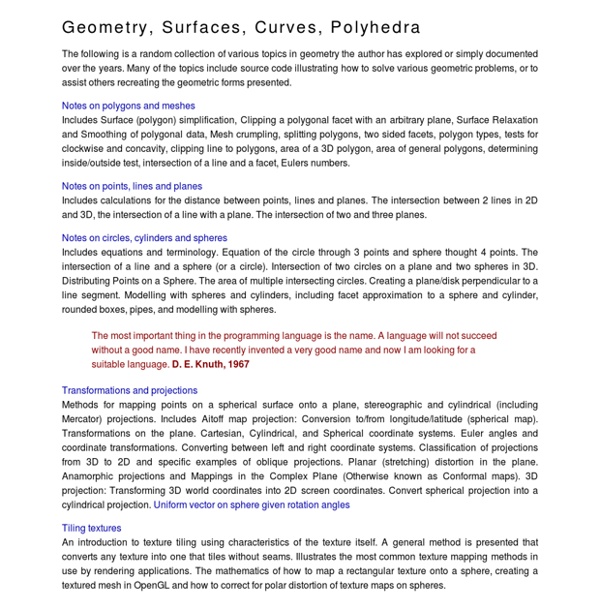WebPlatform.org — Your Web, documented
Floraform – an exploration of differential growth
Introducing Floraform, the latest generative design system from Nervous System. Floraform is inspired by the biomechanics of growing leaves and blooming flowers and explores the development of surfaces through differential growth. We used this system to computationally craft a new 3D-printed jewelry collection, now available on our website. Floraform is a simulation of a differentially growing elastic surface that we created to explore how biological systems create form by varying growth rates through space and time. It began with an unusual flower, Celosia cristata, and led us through a journey of cellular differentiation, discrete differential geometry, kleptoplastic sea slugs, nastic movements, and 19th century zoetropes. Table of Contents // what is differential growth | inspiration | mapping out the simulation space | digital gardening | florescence jewelry collection | what’s next | technical details | bibliography What is Differential Growth? Mapping out the simulation space 1. 2.
GRAFICA Obscura
Visualisation 3D d’une fonction réelle de deux variables (de ℝ² dans ℝ) avec Python -matplotlib | by Joséphine Picot | Medium
PS : Si vous avez déjà suivi le tutoriel “Visualisation des cercles de niveau d’une fonction réelle”, vous pouvez passer directement à la partie “Visualisation” de ce tutoriel car la préparation des données est la même. Tout d’abord quelques librairies sont nécessaires : installation pip install numpypip install matplotlib importation import numpy as npimport matplotlib.pyplot as pltimport mpl_toolkitsfrom mpl_toolkits.mplot3d import Axes3D Si vous avez une erreur lors de l’importation de mpl_toolkit, essayez d’exécuter la commande suivante : ! Étapes de préparation Soit une fonction f de ℝ² dans ℝ. f(x, y) = 2*x² — x*y + 2*y² On définit la fonction f en python : def f(x, y): return 2*x**2 - x*y + 2*y**2 On choisit un intervalle de valeurs dans l’ensemble des réels ℝ pour x et y (je prendrai pour exemple [-100, 100] avec 100 valeurs pour chaque variable). x = np.linspace(-100, 100, 100)y = np.linspace(-100, 100, 100) X, Y = np.meshgrid(x, y) Z = f(X,Y) Visualisation interactive %matplotlib notebook
3D modeler / CAD softwares | wikimal
Let's start a list of useful softwares for 3D modelling / CAD, particularly free ones. Which software to chose (thanks to RealizeBxl) Easy/accessible softwares 123D : By Autodesk. : Online, now Autodesk-owned, and has a free version! Less easy Wings3D: I find it a bit... dry. online 3D modelerDesing spark Mechanical : completly free modeler Different OpenSCAD : Script-based CAD software, allows for parametric models See : for parametric objects on ThingsiverseSee: to add autocomplete in notepad++ (a must have !) 3D scanning Models processing/fixing Other 3D tools Commercial / Professional 3D tools
DotNet Koans | Cory Foy
by Cory Foy on December 20, 2009 For quite a while now, if you want to learn Ruby, you have the Pickaxe book, Why’s guide, and the fabulous Edgecase Ruby Koans on GitHub. The Koans are especially interesting because all you really need to do is setup a working environment and go. It tells you what you need to do next, by way of running the tests and seeing what passes. I thought to myself, why the heck don’t we have something like that for other languages? The goal of the project is to eventually have a guide for C#, F#, and VB.NET – likely in that order. My goal right now is to get everything ported over pretty much as-is, and then look at making sure this fits a good progression. The project is now public up on GitHub at – feel free to download it, play with it, and contribute (or critique) if you’d like.
Matouš Stieber
Fluid Polygons and Polyhedra
Figure 1. Figure 2. Figure 3. When a vertical water jet strikes a circular horizontal impactor, the water is deflected into a horizontal sheet. This series of photos appears in Buckingham & Bush (2001, Phys. [Home] - [Research Interests] - [Fluid Polygons]
curvas
Cuando una curva cambia su concavidad es un punto de inflexión, como el que se toma a toda velocidad en la foto de Jamey Price. Cálculo en espiral o mejor, calculus, que en latín es piedra y origen de nuestro calcular. Foto broken pebbles. Hay hermosas curvas con sencillas expresiones en coordenadas polares. Con una serie de péndulos equilibrados con precisión y un delicado trabajo de representación de curvas el artista Bálint Bolygó dibuja complejas y armoniosas curvas en la superficie de un hemisferio, creando objetos que recuerdan vívamente a mapas estelares tridimensionales y vuelven a llevarnos al asombro de ver cómo el cálculo y las funciones describen el cosmos, esta vez estéticamente. Gráficas y arte que participan en la edición 5.1 del Carnaval de Matemáticas en titoeliatrondixit. Si Euclides define el punto como lo que no tiene partes, debe resultar difícil encontrar medio punto. Para entrar en el mundo de las cónicas, la sencillez de la parábola puede ser un buen comienzo.



